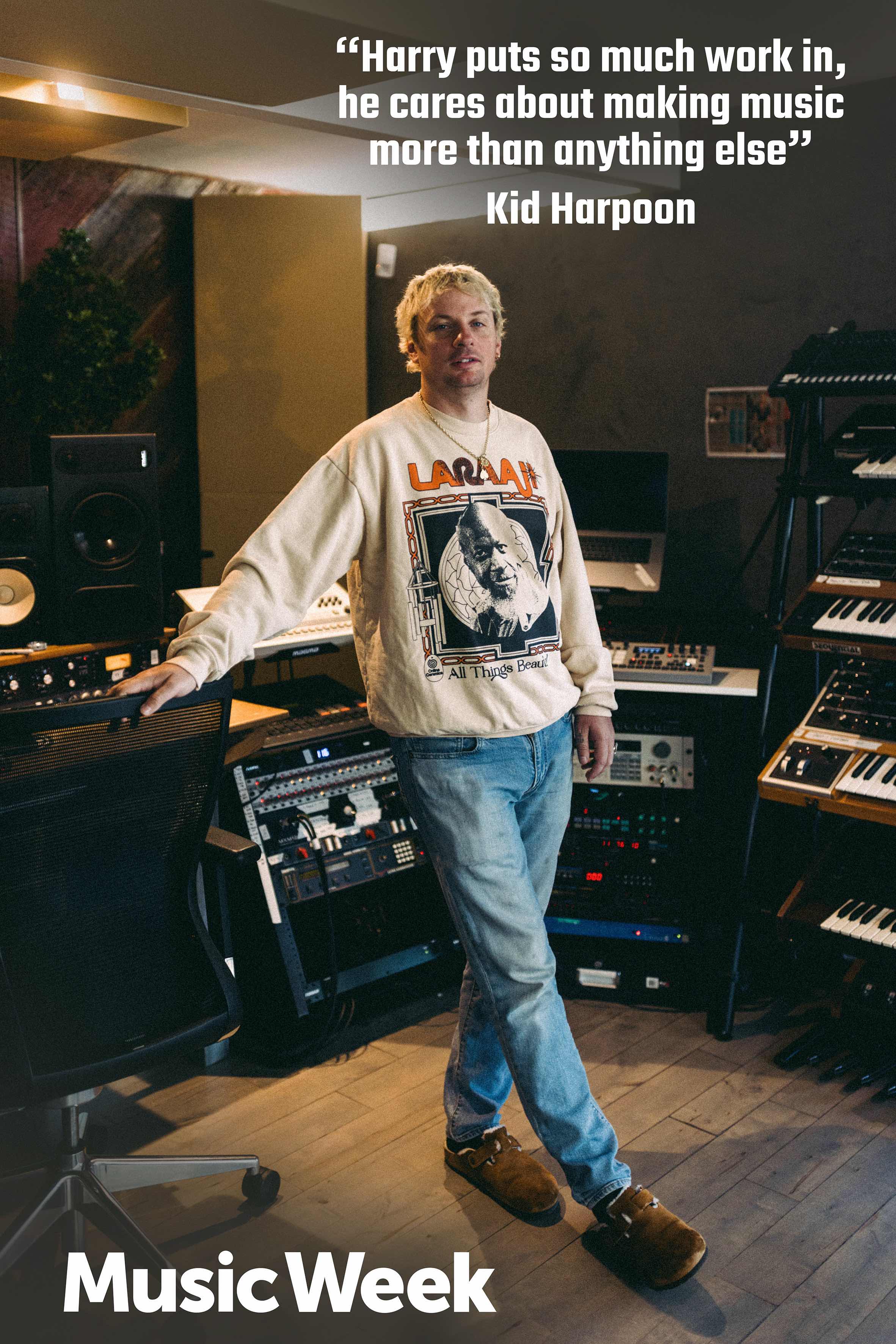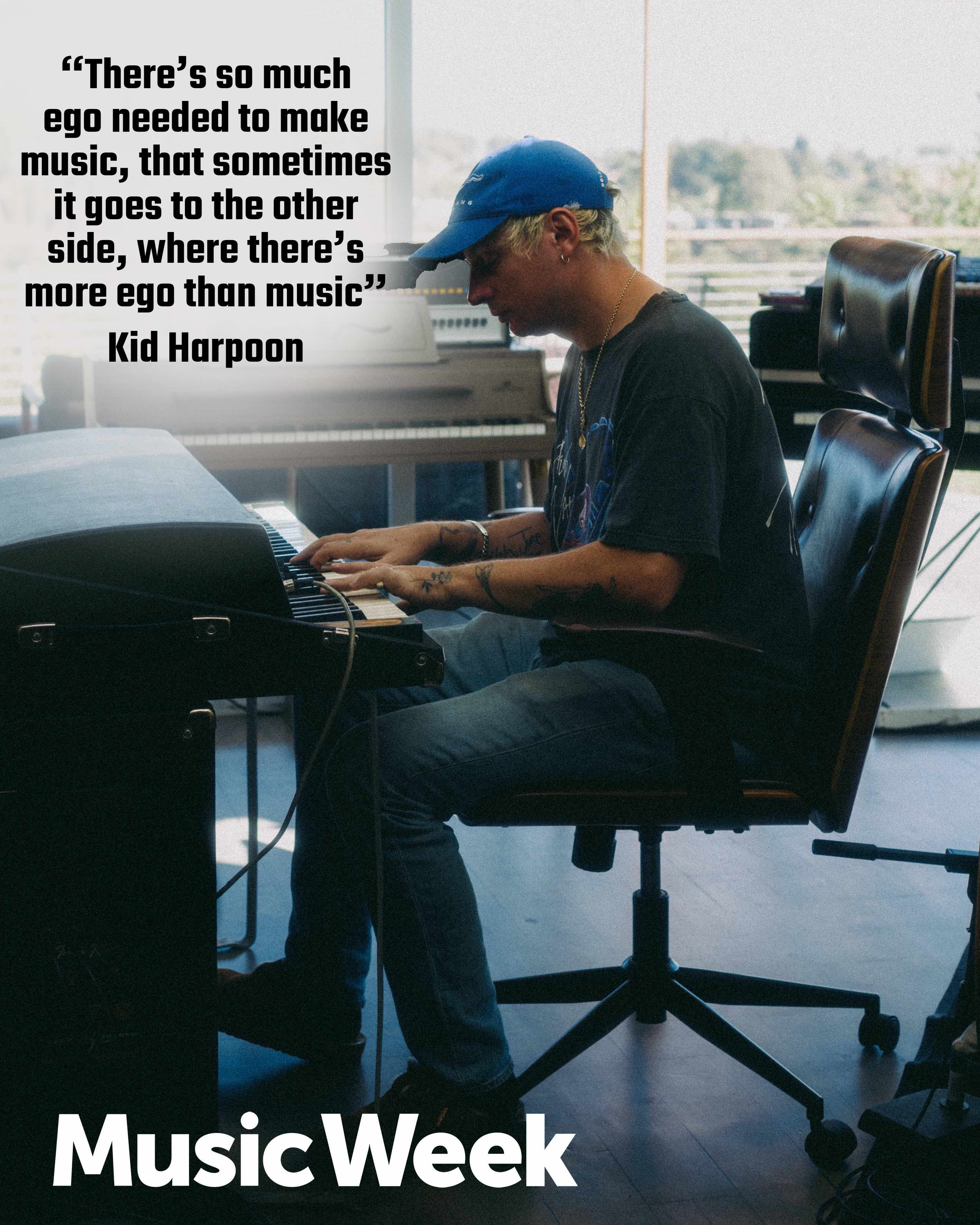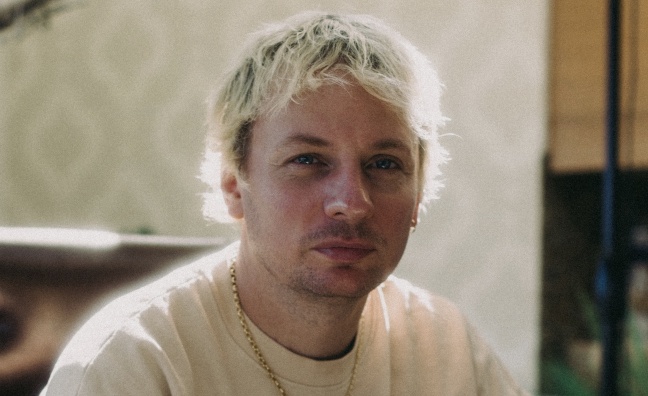Kid Harpoon has likened the unpredictable nature of songwriting to being a contestant on The Great British Bake Off.
Real name Tom Hull, the songwriter and producer was speaking in the wake of his recent success with Harry Styles’ Mercury Prize-nominated third album Harry’s House and Maggie Rogers’ Surrender, the latest additions to his canon. Hull was in the crowd as Wolf Alice played in LA this week, and it sounds as if he’s been keeping tabs on Channel 4’s popular tent-based baking show, too.
“It’s like being on the Great British Bake Off,” said Hull of the creative process involved with making records. “Sometimes, you bake the perfect cake that Paul Hollywood absolutely loves, and sometimes it’s like, ‘It didn’t really work out in the kitchen today.’”
The last time we caught up, for an interview to celebrate Kid Harpoon being named Music Week’s Songwriter Of The Year at the end of 2020, Hull dropped hints about Styles’ Fine Line follow-up, teasing a story about a song written in Tokyo that would become Little Freak.
But even following the success of Fine Line, which came out at the end of 2019, Hull can’t have been prepared for the astronomical success of Harry’s House, which has now racked up 382,403 sales in the UK.
“Harry’s House has felt like it has connected a little bit more culturally,” said Hull. “It definitely feels slightly different to Fine Line in terms of cultural impact and where Harry now sits in culture and everything. He’s just grown into another thing.”
So too, has Hull, who told us he feels like he’s moved up to a higher level as a producer and songwriter now. To explain the reason why, he drew upon advice he received way back when he was trying to make his way as a solo artist with his Kid Harpoon project, in the heyday of 2000s indie in London.
“I remember A&Rs saying, ‘It’s a marathon, not a sprint,’ and this year feels like the bit they were talking about,” he said. “I’ve been doing it for a while and it feels like it’s been building and then this year everything has come together and it feels like the work is paying off.”
Music Week has spoken to Hull on various different occasions since he started working with Styles (and subsequently Rogers, Shawn Mendes, Lizzo and many more), and rarely has he sounded so assured. As The Grammys loom, he’s being heavily tipped by his peers in the US industry and it’s not much of a stretch to imagine Hull and his collaborators winning armfuls of awards.
“It’s been nice to feel more creatively in control as opposed to just playing catch up, which happens a lot at the beginning,” Hull said. “You feel like you’re learning on the job, where now I’m like, ‘Oh, I’ve turned a corner where I feel like I am the job,’ if that makes sense.”
Hull isn’t the kind of writer who would ever align himself with the very centre of modern pop, but having played a key part in making As It Was, the biggest-selling song of this year, he kind of is the job. There’s definitely an argument to be made that his work helps to define the genre at the moment.
And so, in his latest Music Week interview, Hull tries to come to terms with success and opens up about the personality-led approach that, for him, defines making records…

A lot has happened for you since we last spoke, how do you reflect on the past year or so?
“It’s tough making records and I feel like I’ve developed some skills over the past couple of years that have taken a lot of the guesswork out of it. I’m a bit more equipped and have the chops to go at it and really enjoy it. It’s actually to do with experience. A lot of it is knowing what a finished record is gonna sound like and what it takes to make it feel finished and great. It doesn’t necessarily mean the songs are going to connect every time, but just knowing I’m working on something that I can take that to a place where it’s going to exist as something that’s kind of great. Making something sound finished is the hardest thing.”
How do you tackle that?
“Sometimes, the easiest thing is just to throw stuff at it, but I feel like it’s more about intuition. It’s getting better at trusting your instincts and knowing which ones you’re meant to be trusting. And regardless of how awkward it is, maybe you’ve got to say something to someone like, ‘This isn’t quite ready, we need to redo this’ or the opposite, ‘I know you think this isn’t ready, but it sounds awesome.’ It’s being confident in the room that you can be that guy for people.”
It seems as if that’s something you do really well. You’re known as someone who is close with the artists you work with, not the distant person behind the glass. Does that openness make the job easier or harder?
“It can do both actually. On the one hand, you get to a place where you’re really close. I had this with Maggie, by the end we were really in sync on that record, where I knew when I was making decisions, I was in tune with her. I’m going to pre-emptively get it to where I like it knowing that I’ve saved her some of the work to get to that place. But then on the flipside, it can also mean you’re so close that… It’s that classic thing of, if a friend recommends a TV show, you’ll go and watch it, whereas if your wife, sister or brother recommends it, you’ll completely ignore it. It’s that thing of sometimes you can be too close that it gets difficult to… Sometimes an external opinion becomes quite powerful. It’s a balancing act between being really close and then being able to step in independently as well.”
Has the increasing success you’re enjoying changed how you go about what you do?
“It definitely has, it couldn’t not. People treat you a bit differently and they look to you for different things, but I definitely feel like all of that stuff outside the music is really hard to… There are ways of repeating the same thing over and over, but the way I do music, it’s really hard to tie [success] distinctly into the music making process. You have to see them as two separate things. The stuff that happened with Harry happened, but there’s so much stuff that has to line up that isn’t to do with the music making process. There’s some really amazing, incredible music out there that hasn’t sold the same numbers Harry has, but it just didn’t line up for them and maybe it will do in different ways. Even Heat Waves by Glass Animals, it took, what, two years for that song to really come out [hit the mainstream]? Sometimes it’s just about time and place, all the marketing campaigns and all the things lining up correctly. A lot of it feels out of your control, so all you can do is focus.”
Do you have a way of measuring the success of your work?
“Sales and streaming are great, but more importantly it’s about the significance you have in culture. Harry’s obviously sold a lot of records this year, but then a band like Fontaines DC, who I think are incredible, may not be doing the same numbers on streaming, but they’re having a great cultural impact. They’ve both had equally good years, but in different ways, it’s not necessarily about streaming. We were super-stoked to get the Mercury nomination and things like that, which kind of indicate that you’ve had the impact. It’s been awesome, but for me to relate it to streaming numbers is hard to process.”
The Mercury Prize was awarded to Little Simz this week, but what did it mean to be nominated?
“It was awesome. With Fine Line we got a nod at The Ivors and now with the Mercury. One thing I know from living in America is that it’s a big cultural difference, that’s the one you want. You don’t want the record that says, ‘Congratulations, you’ve sold lots and lots of records,’ you want the one that says, ‘Congratulations, we like you, we think you’re pretty cool.’ There isn’t really a tangible way to do that. But to get the nod… Harry isn’t an obvious nod, you know, he’s a pop star. So for him to get a nod for the Mercury is just so awesome. It just shows that the work he puts in… He puts in so much to the music for it to be like [it is], he cares about the music more than he cares about record sales or anything else. So for us, when we get something like that it shows that cultural thing. And it’s the same at the Ivors, you get that nod from your peers and it’s like, ‘Well done.’”

Having grown up with it in the UK, how do you think the Mercury Prize impacts the music industry now?
“Sometimes] it’ll be a leftfield jazz act doing something incredible, I heard the pianist [Fergus McCreadie] who was up this year and I thought he was incredible. That makes sense, those guys get recognised because they’re putting something into culture that people on a bigger scale will never see. That will permeate into music that everyone’s doing and will suddenly appear in pop music. You know, if someone like me is hearing it. I’ll be in with someone like Harry and will be like, ‘Oh man I heard this,’ and that will influence something. So those people get recognition at awards and deservedly so. For Harry to be recognised as someone who’s had an impact on culture… that’s what the Mercury says to me, more than a numbers, streaming thing. That’s why we were so chuffed, it was so cool.”
The Grammys are on the horizon too. You’ve been recognised there before, but what does the event mean to you?
“It’s the same sort of thing on a bigger scale. It’s recognition from your peers in the music industry. Although my life is going to be the same with or without awards, with something like the Grammys, it’s so big globally. It’s recognition from your peers that you’ve achieved something special or that they acknowledge is great. Especially being British, it’s like, you managed to get off the island and you’ve gone over there and people have recognised you in another country. It suddenly feels like a bigger thing and feels really exciting. I don’t think you can ever make music for that or any other reason, sales, awards or anything. But for it to happen after you’ve done it is awesome. It’s a special thing to feel like you exist in the ether and culture of music that will be going on long beyond when you stop making it, to feel like you’re part of that lineage. That’s what’s nice with [breaking] records too. People say, ‘Harry’s the first guy to do this [insert record here].’ It’s like, ‘Great, I didn’t know who the guy was before that did that, but it’s nice to feel connected to the whole conversation.’”
Do you ever talk to the people you work with about winning awards?
“Not really. I feel it’s dangerous because it then becomes your ambition. What tends to happen is, we don’t necessarily talk about it and then when it happens you go, ‘Oh great!’. But I’m always joking around in the studio being like, ‘Imagine this one at Wembley Stadium’ or, ‘Goodnight Coachella!’ Or I’ll do a, ‘And the Grammy goes to…’ So you’re always joking around it, but at the same time it’s important to be aware of it, because in the studio, you should be aiming to be great at all times. The thing I love about the Grammys and US culture is that, if you’re in the UK and you’re a jazz piano player, it’s tough. It’s a hard life. Unless you’re the top, cream of the crop, you’re trying to find your way into pop music, sessioning for someone and doing a bit of jazz on the side, playing in Pizza Express or in hotels or whatever… In America, you can literally win a Grammy for being a jazz pianist. I love how they respect different genres and shine a light on the whole thing.”
Do you think the story of your career sends a message to the aspiring songwriters and producers about what’s possible?
“What I’d like it to say is that I feel like part of my integrity as a songwriter is also connected to me as a person. There’s so much ego needed to make music, that sometimes it goes to the other side, where there’s more ego than music. I’d like to [prove] that if you just work hard, be good to people, then you can achieve all those things that anyone else could. What’s been a bit of a battle for me is, I’m kind of a mellow, chilled guy, not necessarily the big, alpha, ‘Do this, do that!’ and a lot of the big music people are. I can be a bit more sensitive. I think it shows that just because you might be someone really quiet who’s like, ‘I could never do this, I could never do that,’ you could do anything. It’s just about the music and the work and if you’re a good person, it will all be fine. It’s the music that matters. Living in LA is great because the work is all here. But oftentimes the best work gets made elsewhere. Fontaines DC in Ireland, Fergus McCreadie up in Scotland. The best music is getting made everywhere. It brought me to LA because that was what I wanted to do music-wise, but essentially we’re part of that whole conversation. So I hope my journey can be a symbol of, ‘Oh great, I’m gonna [do something]…’ as opposed to thinking, ‘Oh I’ll never do that because that’s in LA and I can’t get to LA and I can’t get in the room with a Bruno Mars or a Harry Styles.’ I hope that’s what it shows.”









